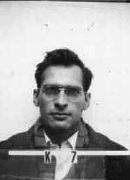Paul Olum
| Paul Olum | |
|---|---|

Paul Olum, date unknown
|
|
| Born |
August 16, 1918 Binghamton, New York, United States |
| Died | January 19, 2001 (aged 82) Sharon, Massachusetts, U.S. |
| Citizenship | American |
| Nationality | American |
| Fields | Mathematics |
| Institutions |
Cornell University University of Texas University of Oregon |
| Alma mater |
Harvard University Princeton University |
| Doctoral advisor | Hassler Whitney |
| Doctoral students | Martin Arkowitz Jean-Pierre Meyer Norman Stein |
Paul Olum (August 16, 1918 – January 19, 2001) was an American mathematician (algebraic topology), professor of mathematics, and university administrator.
Born in Binghamton, New York to a father who was a Russian Jew who immigrated at age of nine to escape persecution, Olum took an interest in mathematics at an early age. He graduated summa cum laude from Harvard University in 1940. In 1942 he married Vivian Goldstein, completed an MA in physics at Princeton University, and joined the scientific staff of the Manhattan Project. During his time at Los Alamos, Olum was among the Los Alamos scientists who questioned the implications of the atomic bomb, and after its use against Japan, he became a lifelong advocate for world peace and for nuclear arms control.
Reportedly, one reason he switched from physics to mathematics as his field was that compared to his office mate, future Nobel laureate Richard Feynman, Olum did not think he was good at physics. He returned to Harvard after the war to complete his Ph.D. in mathematics in 1947 under Hassler Whitney as his thesis advisor. Among his close friends was Feynman, who wrote in his autobiography of Paul’s intelligence. In one anecdote, Feynman told of an experience at Los Alamos when he had claimed to be able to take any problem that could be stated in ten seconds and find an answer to within ten percent in no more than sixty seconds. When Feynman made this challenge to Olum, he quickly responded, “Find the tangent of 10 to the 100th.”
Following a postdoctoral year at the Institute for Advanced Study, Olum joined the Cornell University faculty in 1949. Over the next 25 years at Cornell, Olum rose to the rank of professor, served in various administrative roles, and spent time as a visiting faculty member at the University of Paris, Hebrew University, Stanford University, and the University of Washington, and also returned as a member of the Institute for Advanced Study.
...
Wikipedia
